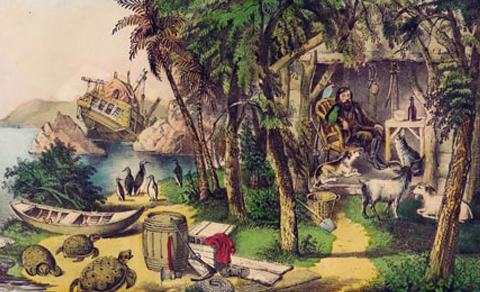 2014
2014
A fisherman claiming to have been lost at sea for nearly thirteen months has recounted his harrowing tale after washing ashore in the Marshall Islands. Jose Salvador Alvarenga, a native of El Salvador living in Mexico before his disappearance, claimed to have survived on fish and rainwater for the year in which he drifted across the Pacific Ocean. CNN reports:
CNN asked Alvarenga how he survived his time at sea. He pointed upward and said, “God ... My faith in God.”
“I thought, ‘I am going to get out,” he said. “Get out, get out, get out.”
But he also admitted to dark moments, saying he considered killing himself. “Twice I wanted to,” he said, as he gestured slitting his throat. “I wanted to with a knife. When I didn't have water, food; I gave up and I grabbed a knife.” But he didn't go through with the act, he said, because he was “scared.”
During his long period at sea, Alvarenga said he lost track of the date and the day of the week. He would follow the sun's path across the sky, he said, indicating the movement with his hands as he spoke. “(I didn't know) the date or the day, only the hours,” he said. “Only when it was getting dark and when the light was coming out.”
 1709
1709
Daniel Defoe’s Robinson Crusoe, published in 1719, sparked a centuries-long fascination with lonely castaways lost at sea. Defoe’s tale was rooted in reality, though—he was inspired by the story of Alexander Selkirk, a Scotsman marooned on Juan Fernàndez Island, where he was discovered in 1709 with little more than his wits and a Bible for company:
He had with him his clothes and bedding, with a firelock, some powder, bullets, and tobacco, a hatchet, a knife, a kettle, a Bible, some practical pieces, and his mathematical instruments and books. He diverted and provided for himself as well as he could, but for the first eight months had much ado to bear up against melancholy and the terror from being left alone in such a desolate place. He built two huts with pimento trees, covered them with long grass, and lined them with the skins of goats, which he killed with his gun as he wanted, so long as his powder lasted, which was but a pound—and that being near spent, he got fire by rubbing two sticks of pimento wood together upon his knee. In the lesser hut, at some distance from the other, he dressed his victuals, and in the larger he slept and employed himself in reading, singing psalms, and praying—so that he said he was a better Christian while in this solitude than ever he was before or than he was afraid he should ever be again.